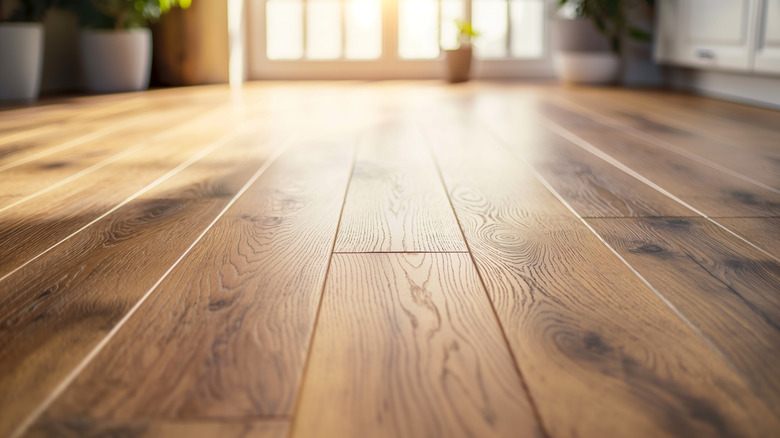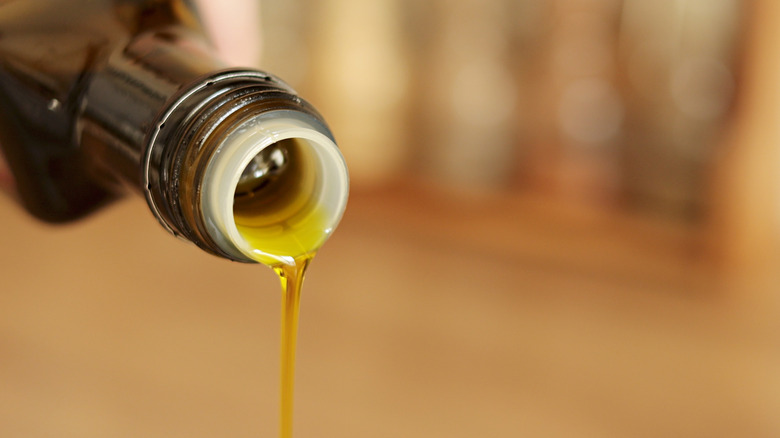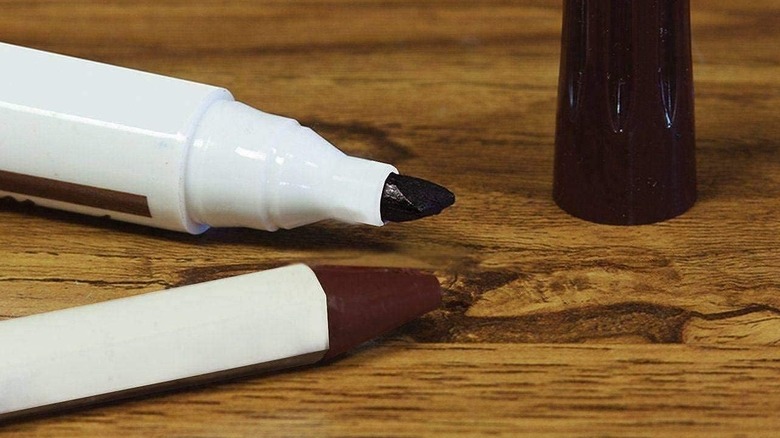Will Olive Oil And Baking Soda Fix The Scratches In Your Hardwood Floors?
We may receive a commission on purchases made from links.
Gleaming hardwood floors take almost any space from good to great. From their timeless appearance to outstanding return on investment, there are many reasons hardwood floors will always be the right choice for a home. Even when you have extremely durable hardwood floors made of hickory, walnut, or maple, scratches and dents may show up over time. Stripping and refinishing floors is a majorly messy undertaking that can be seriously inconvenient even if it makes your floors shine like new again, so it's no surprise that inexpensive viral trends promising to quickly help hardwoods look their best are extremely popular with homeowners. You may have seen one of these tricks recently, which involves mixing baking soda with olive oil, applying it to scratches in hardwood floors, and letting it sit for a few minutes before buffing it away with a soft sponge. But according to Skylar Bartlett, Owner at Kreer Construction, this hack is just a temporary fix.
"So, this trick might help the appearance of very light surface scratches — but it's definitely not a fix-all," Bartlett told House Digest during an exclusive interview. "The olive oil can help blend the scratch into the surrounding wood by adding a bit of shine or depth, especially on darker-stained floors. The baking soda acts more like a gentle abrasive, which could help smooth out the edges of a shallow mark."
Start small and remember to spot test if you try this hack
There are a lot of baking soda cleaning hacks that are worth trying. But despite its ability to shine up and slightly smooth out shallow marks, Skylar Bartlett isn't totally convinced by this one. "You're not really 'repairing' the scratch — just making it less noticeable temporarily," she explained during her exclusive interview with House Digest, adding, "I think these kinds of hacks take off because they do make a small visual difference on certain floors ... And when the scratch is shallow enough, even a little shine from olive oil can trick the eye into thinking it's 'fixed'.
Bartlett went on to say that she understands "people love a cheap, pantry-based solution," but the expert said to start small if you want to test this method out for yourself. "Stick to minor, surface-level scratches only," she suggested. "This method won't work on anything deep or structural, and on lighter floors, it might even darken the spot temporarily because of the oil." Bartlett highly recommended doing a spot test in a discreet place before applying your paste to an entire room. Once you're confident it won't react badly with your hardwood flooring, you can get started. "Apply it gently to the scratched area with a soft cloth or sponge, working in the direction of the grain," she suggested. "Let it sit for 5 minutes max, then buff it out with a clean microfiber cloth."
There are better ways to get long lasting results
When it comes to hardwood floor hacks, Skylar Bartlett said to ditch the baking soda and olive oil for a walnut. "If you want a more effective home remedy, I'd recommend trying the walnut trick for minor scratches – no joke! Rubbing the meat of a walnut over a shallow scratch can help fill it in and blend the color slightly, thanks to the natural oils in the nut," she told House Digest during her exclusive interview. But when your floors are really looking rough, there are better ways to get long-lasting results.
Bartlett suggested scratch repair markers or wax sticks, like the bestselling DAIXISM Furniture Repair Wood Markers. "If you've got multiple scratches or dull spots, a screen and recoat (a light sanding followed by a new layer of finish) might be worth it. This can revive your floors without a full refinish," she added. Board replacements should be left to the experts. "For deep gouges or damage, it's best to call in a pro," Bartlett recommended. "A good installer can replace a board or blend in a custom repair seamlessly."
Finally, remember that scratches and dents don't come out of thin air. From leaving your beater bar on while vacuuming to forgetting to regularly trim your pet's nails, there are several ways you might be damaging your hardwood floors without even noticing. "At the end of the day, no pantry hack beats proper maintenance," Bartlett cautioned. "Keep grit off the floors, use felt pads on furniture, and touch up damage before it spreads."


